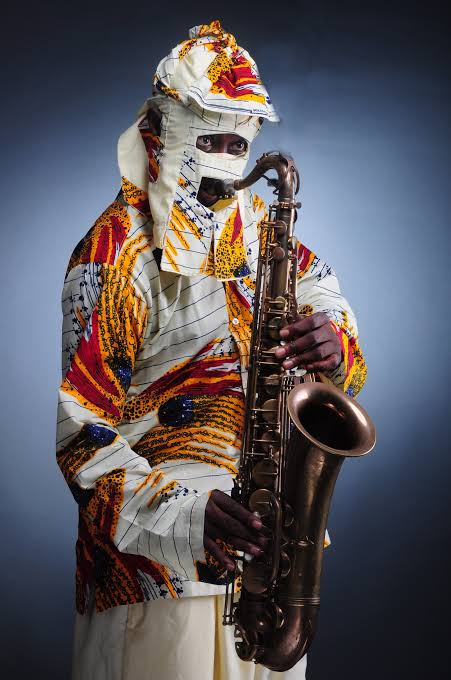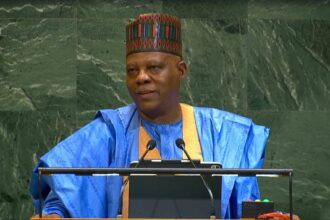Lagos, a city that never truly sleeps, pulsed with a rhythm of anticipation that night. The streets were alive with chatter, car horns blending with distant street music, while neon lights painted the night sky above Victoria Island.
Word had spread like wildfire: the “Saxy War” was coming—a head-to-head duel between two of Nigeria’s most revered saxophonists, Lagbaja and Femi Kuti. It was billed as a battle of musical titans, a contest of improvisation, passion, and sheer virtuosity.
Fans lined the streets, eager to witness history. The music community, journalists, and celebrities whispered in hushed tones about the showdown, debating who would claim the title of Nigeria’s ultimate saxophonist.
The stage, set at a popular Lagos open-air venue, gleamed under the lights, adorned with traditional drums and modern amplifiers—a bridge between Afrobeat heritage and contemporary spectacle. The air itself seemed to thrum, as if the city were holding its breath for the first note.
Yet, behind the excitement, a tension lingered—an invisible question mark hanging over the event. Would this duel honor the essence of Afrobeat, or would it reduce art to a mere competition? As the crowd waited, no one could foresee the twist that would change the night forever.
Origins of the Saxophone Icons
To fully grasp the gravity of the “Saxy War,” one must first trace the paths of the two men at its center.
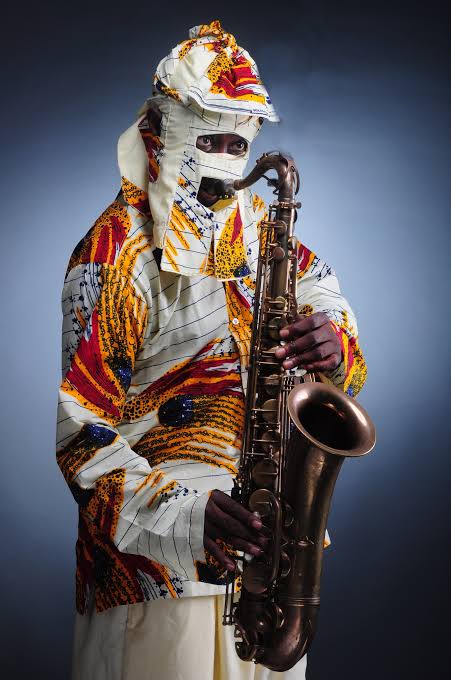
Lagbaja, born Bisade Ologunde in Lagos, emerged in the early 1990s as a force of musical mystique. His choice to perform masked was more than theatrics; it was philosophy incarnate. The mask symbolized anonymity, the faceless “everyman” in Yoruba society, and a critique of celebrity worship. Musically, Lagbaja fused Afrobeat, jazz, funk, and traditional Yoruba rhythms, crafting songs that spoke to social issues, love, and human identity. He insisted that music was communal—a space for connection, not competition. For Lagbaja, every performance was a call to unity, an invitation for the audience to become part of the story.
Femi Kuti, on the other hand, carried a legacy as large as his reputation. The eldest son of Fela Kuti, Femi inherited more than a saxophone; he inherited a movement. Leading the band Positive Force, he transformed Afrobeat into a platform for activism, addressing corruption, social injustice, and political oppression. Femi’s performances were electrifying, his saxophone a voice of defiance and cultural pride. While he embraced the spotlight, he maintained a deep respect for musical integrity, often crediting collaboration over rivalry as the driving force behind Afrobeat’s evolution.
The careers of these two musicians had intersected at points, with mutual nods of respect and occasional collaborations. Both were torchbearers of Afrobeat, yet their philosophies occasionally diverged: one emphasizing unity through mystique, the other challenging authority with boldness and visibility.
The Build-Up to the Duel
The concept of a saxophone duel was proposed by a prominent event organizer seeking to capitalize on Lagos’ insatiable appetite for spectacle. The “Saxy War” was framed as the ultimate test of musical prowess—Lagbaja versus Femi, two legends, one stage, one victor. Media outlets picked up the story with gusto, promoting it as a once-in-a-lifetime confrontation, complete with flashy posters, interviews, and countdowns. Social media buzzed with predictions, memes, and heated debates about who would reign supreme.
In Lagos’ nightlife, the story dominated conversations. Clubs replayed Lagbaja and Femi Kuti’s greatest hits, comparing solos and styles. Radio stations hosted call-in debates. Fans painted faces in homage to their favorite artist, while street vendors sold makeshift merchandise emblazoned with saxophones in combat. The city itself had become part of the narrative, a living, breathing stage for a musical showdown that promised to blend tradition and modernity.
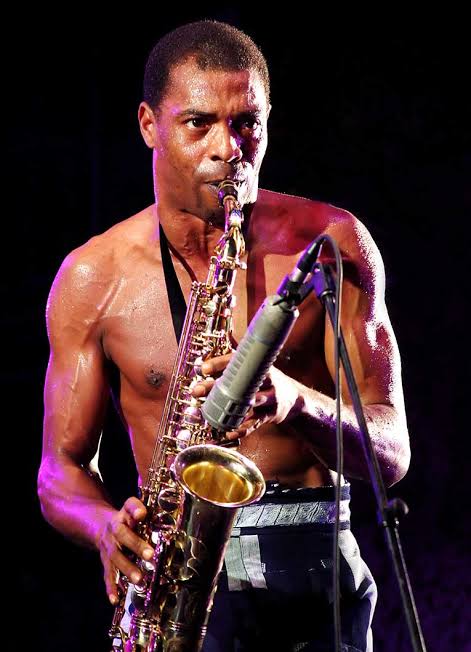
Yet beneath the fanfare, a philosophical tension simmered. Could music, at its core, truly be reduced to competition? Was this duel honoring Afrobeat, or commodifying it into a spectacle of winners and losers? For Lagbaja, this framing would soon become a defining concern.
Lagbaja’s Withdrawal
As the event approached, Lagbaja made a decision that stunned the entire music community: he withdrew. The exact sequence was as much logistical as philosophical. Sources close to him reported that he learned of promotional materials portraying the duel as a competitive “battle” rather than a collaborative performance. For Lagbaja, this was unacceptable.
He had always maintained that Afrobeat was a collective expression, a medium to address societal issues, celebrate culture, and unite audiences. To reduce it to a contest contradicted his artistic integrity. Behind closed doors, he conveyed to organizers that he would not participate if the duel were presented as a rivalry.
Media frenzy followed his announcement, with some praising his courage to uphold principles, and others lamenting the lost opportunity for history.
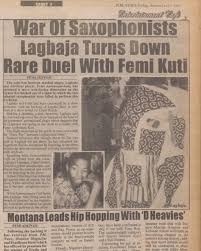
The Rivalry: Competition or Construct?
The public perception of rivalry between Lagbaja and Femi Kuti was often framed as a battle for the Afrobeat throne. Media narratives and fan debates portrayed their interactions as a zero-sum contest—a musical duel where only one could emerge as the definitive icon. Posters, interviews, and social chatter fueled the sense that the “Saxy War” would resolve a rivalry that had long simmered beneath the surface.
However, interviews and statements from the artists themselves reveal a far more nuanced reality. Lagbaja acknowledged the rivalry, stating, “There will always be rivalry between me and Femi Kuti,” but he emphasized that it was rooted in mutual respect and artistic competition rather than personal animosity.
Femi Kuti echoed a similar sentiment, noting, “Lagbaja is never my competitor,” underscoring the mutual admiration and understanding that defined their interactions.
This nuanced dynamic highlights how public perception often distorts artistic relationships. What appeared as conflict was in fact a reflection of two creative forces pushing each other to excel, their so-called rivalry serving more as inspiration than contention. The “Saxy War” hype, therefore, was less a reflection of personal animosity and more a product of media framing, fan expectations, and the commercial appetite for spectacle.
The Aftermath
The non-duel left reverberations across the Nigerian music industry. Lagbaja’s decision reinforced his image as a principled artist who prioritized authenticity over commercial gain. His subsequent performances maintained the communal, unifying themes that had always defined his music. Femi Kuti continued to build his legacy, performing internationally and using Afrobeat to amplify social issues, unaffected by the absence of a head-to-head showdown.
The incident also sparked broader reflections on the commercialization of Nigerian music. Artists, promoters, and audiences debated where to draw the line between entertainment and the preservation of cultural values. While some promoters continued to experiment with duels and competitions, Lagbaja’s withdrawal became a touchstone for the argument that music carries responsibility beyond the stage.
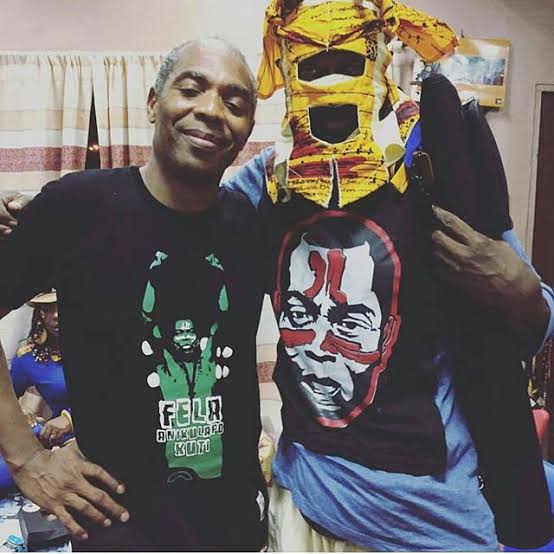
Fans, meanwhile, remained engaged. Conversations persisted online and offline about the potential energy and magic of the night that never came. For many, the story of the “Saxy War” became almost mythic—a lesson in integrity, an anecdote for aspiring musicians, and a reminder that art cannot always be forced into commercial molds.
Analysis: What It Means for Nigerian Music
The “Saxy War” episode is more than an anecdote; it is emblematic of a larger tension in Nigerian music. Afrobeat, while commercially viable, is deeply rooted in cultural identity, social commentary, and communal engagement. The framing of music as spectacle risks diluting its essence.
Lagbaja’s withdrawal highlights a necessary dialogue: the balance between authenticity and entertainment. It reminds artists that cultural expression has boundaries not to be compromised for applause or profit. For future generations, this story serves as guidance: musicians can achieve fame, commercial success, and audience adoration without surrendering the ethical core of their craft.
Moreover, the incident illustrates Afrobeat’s role as a movement, not merely a genre. Its history—rooted in the activism of Fela Kuti and carried forward by Femi and others—demonstrates that music is a tool for connection, reflection, and societal critique. Any attempt to reduce it to spectacle undermines its transformative power.
Conclusion: The Duel That Became a Lesson
The “Saxy War” never occurred, yet its impact resonates decades later. Lagos held its breath for a night that would have been a clash of saxophones, but instead, it witnessed a reaffirmation of principles. Lagbaja’s withdrawal symbolized more than a missed performance; it was a statement about integrity, authenticity, and the unifying power of music.
In the end, the true victory was not about notes, solos, or applause. It was about the reminder that music, especially Afrobeat, is a philosophy as much as it is a sound. It connects communities, speaks to the oppressed, celebrates culture, and challenges the status quo.
Lagbaja and Femi Kuti, in their own ways, continue to embody this philosophy—proving that sometimes, the most profound statements are made not through performance, but through principled restraint.

